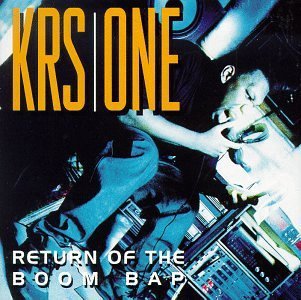
Don't worry, you haven't gone back in time; this album was released in 1993. Still, I think too few people have heard it, and that's a crying shame, because it's one of the best hip-hop albums ever created.
Don't call it a comeback
In 1993, Boogie Down Productions was old news. Their (and when I write "their" I really mean "his," meaning KRS, because after Scott La Rock's death, BDP was always basically Kris solo, surrounding himself with people who complimented him) last album, Sex and Violence, had received poor reviews and sales, and it was rumored that Kris was beefing with other members in the "massive BDP crew," such as D-Nice. While not a bad record in its own right, S&V was worse an effort than Edutainment (which some complained was a poorer effort than Ghetto Music: The Blueprint of Hip-Hop, this trend continuing on down to 1987's Criminal Minded), and most BDP fans believed KRS was through with the "group". A highly-publicized incident at Big Daddy Kane's birthday party where KRS bumrushed PM Dawn's Prince Be and threw him off the stage, and another beef with fellow conscious rappers X-Clan, left many scratching their heads, wondering if Kris was going to stop the foolishness and get back to making dope music. Like many, by 1993, KRS ONE was barely on my radar.
Kris went for delf, dropping the BDP name (although he says it dozens of times during the album), and inlisting the talents of some of the biggest name producers of the time, including DJ Premier and Showbiz. The switch from BDP to KRS ONE was strictly a cosmetic one, much like Kentucky Fried Chicken becoming KFC, but it must have helped light a fire under Kris. His mic prowess, which was never in question, took a Jordanesque leap to an insane level of skill. Besides Boom Bap, the only other album whose lyrics I still find myself repeating in my head to this day is Common Sense's Resurrection. Lyrically, that's some pretty solid company right there.
Then there are the beats. The album title doesn't lie -- the beats are harder than writing the periodic table on a potato chip. At the time, hip-hop was being dominated by the G-funk sound (dope in its own right, but becoming waaaay overused by artists on both coasts), and many forget that this came out almost 2 months prior to Wu-Tang's Enter: The 36 Chambers, which is largely considered as the epoch of the return to that gritty NY sound. Boom Bap harbingered what was to come.
The album starts off with a 2-minute instrumental, produced by DJ Premier, which uses some of KRS's classic lyrics from the BDP era. But this certainly isn't trying to relive past glories, as the first proper track, the album's best song and first single, Outta Here (also produced by Premier), blazes out of the gate. Next is the dancehall-influenced Black Cop (first heard on the CB4 soundtrack), a critique of African and African American police officers. Mortal Thought, a jazzy Premier track, sets the lyrical tone for the remainder of the album. I don't think Kris has ever been as playful on the mic as he is here, telling wack MCs that they're "full of more junk than a sausage." I Can't Wake Up posits KRS in the role of a blunt being smoked by some of hip-hop's luminaries...and Bill Clinton. Another soundbwoy slaughter, Smack Them Up, follows, and then it's the classic Sound of the Police, a Showbiz banger that elicits the same head nods it did 12 years earlier. Mad Crew's hard, snapping drums and horn stabs keep up the pace. Uh Oh is a cautionary youth tale utilizing KRS's beatbox as bassline and percussion. Brown Skin Woman is another horny track, one with a postive message for black, sorry, brown-skinned ladies. The freestyle nature of the titular track that follows is cooler than, to quote Big Boi, a polar bear's toenails. The P Is Still Free updates the classic Criminal Minded song with a hard-hitting, hypnotic beat. Stop Frontin' finds KRS and Kid Capri rhyming over a mellow, horn-laced beat (it's funny, this album has more banging horns than a Pete Rock and CL Smooth record), and the album's closer, Higher Level, finds Kris as his old, conscious self, questioning, among other things, the Pope and the Vatican.
1993 was a good year for hip-hop, and this album is one of that year's best. If you haven't heard it, check it out. If you have, do like I did today and revisit a classic. It still holds up.
A couple of hip-hop-related thoughts:
- I can't believe it's been 5 years since Stankonia's release and no soap company has used So Fresh, So Clean in a TV commercial.
- I want to revise my original review of the Little Brother The Minstrel Show album. I've listened to it a few times recently and it's really grown on me. It's still not a classic (there's too much singing on it, Big Pooh is mediocre as fuck, and the album deserves at least a half-star minus for Joe Scudda's guest verse alone), but it's a solid 4/5 for me now.

A fine album indeed
ReplyDelete